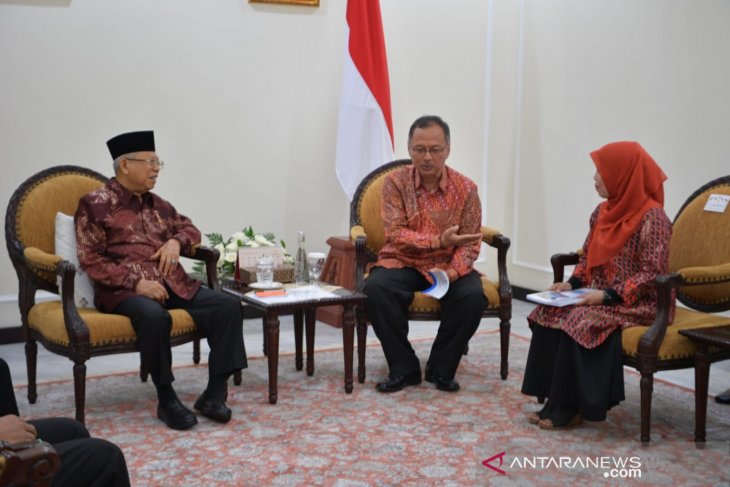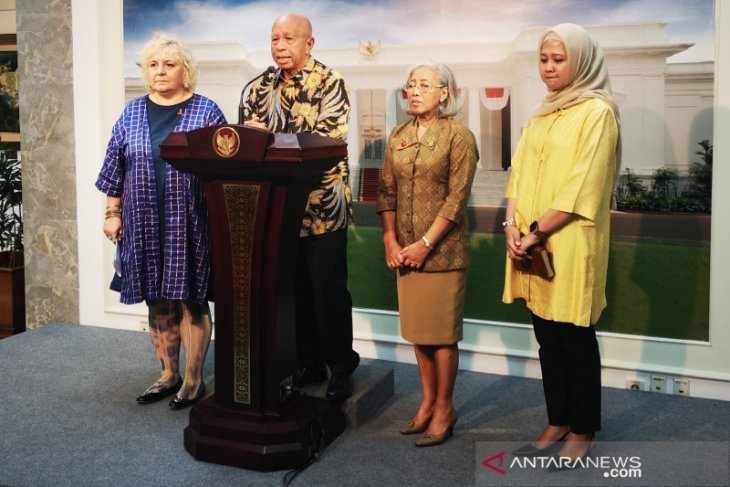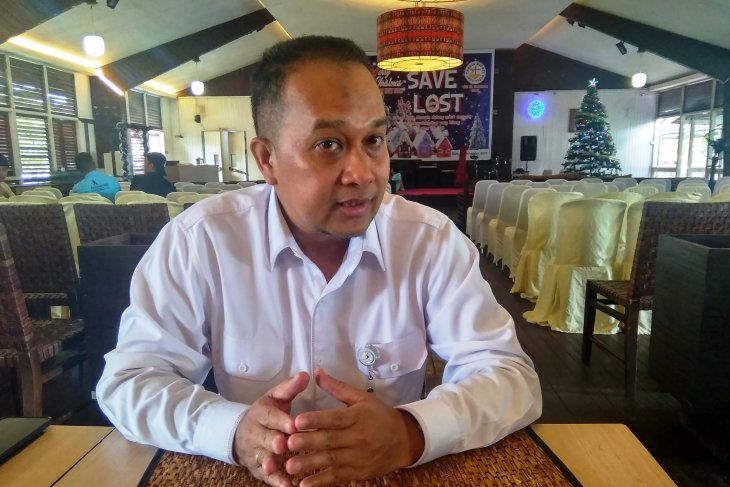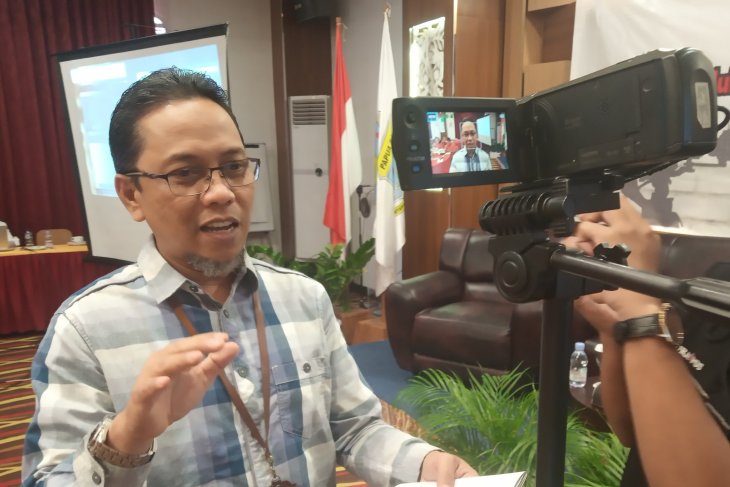Live Streaming
Program Highlight
Company Profile

Ani Hasanah
December

Vice President Ma'ruf Amin received Rector of Malang-based Maulana Malik Ibrahim State Islamic University (UIN) Abdul Haris, at the Vice Presidential Office in Jakarta on Tuesday. (Secretariat of the Vice Presidential Office)
Vice President Ma'ruf Amin received two concepts of developing a sharia-compliant economy through rural areas and Islamic boarding schools (pesantren) from Maulana Malik Ibrahim State Islamic University (UIN) in Malang, East Java, Tuesday. The involvement of the rural community and pesantren can support the conventional economy which has been running well, Abdul Haris, rector of UIN Malang said at the Vice Presidential Office.
"This will greatly help the development of a sharia-compliant economy as a whole. It will not contradict conventional businesses but will complement each other," Haris said.
The development of the two concepts can increase domestic production of halal goods which have become the ideals of the Vice President to utilize them optimally.
The strategy of developing the two concepts of sharia economy involves five related community groups called pancahelik. They are the government as a regulator, the community as an object of development, institutes of higher learning as a training provider, and businessmen and the banking institutions, he said.
"At the UIN Maulana Malik Ibrahim campus, we have started (the concept). Some of the programs are integrated with Tri Dharma, research, education and dedication," he said.
During the meeting, the UIN Malang rector also revealed about the management of alms being used as loans for the community to strengthen the business capital. To date, UIN Malang has channeled loans to residents of 12 villages, equivalent to some 1,500 micro, small and medium businesses (UKM), he said.
"UIN Malang has collected profession alms used as interest-free loans for micro, small and medium businesses. The amount of loans is small with the maximum amount being Rp10 million. Most of the loans amount to Rp2 to 3 million," he said.
At the meeting, the Vice President asked UIN Malang and other institutes of higher learning to develop a people-based economy that could encourage the growth of private businesses in the community. (ANTARA)
December

Chief of the Stop TB Partnership Forum for Indonesia (FSTPI) Arifin Panigoro, along with Executive Director of Stop TB International, Lucica Ditio (left) held a press conference following a meeting with President Joko Widodo at the Merdeka Palace in Jakarta on Monday (9/12/2019). (ANTARA)
President Joko Widodo (Jokowi) is preparing a regulation to combat tuberculosis (TBC) in Indonesia, according to Chief of the Stop TB Partnership Forum for Indonesia (FSTPI) Arifin Panigoro.
"One point highlighted by (the president) to ensure smooth cooperation among ministries and institutions is that he is preparing a presidential regulation on combating TBC," Panigoro stated following a meeting with President Jokowi at the Merdeka Palace in Jakarta on Monday.
Through the presidential regulation, not only the Health Ministry but also the Home Affairs Ministry and other relevant ministries can partake in efforts to eradicate TBC, he remarked.
"As we all know, regions in Indonesia have a strong autonomy, so regional heads, including governors and district heads, play a very important role," he noted.
As a civil organization, the FSTPI remains resolved to fight TBC in Indonesia, he emphasized.
"What we are doing is only combating TB or TBC. We will report this to the presidents of Indonesia, China, and India that bear witness to the largest number of TBC cases in the world, so they must be serious about combating it," he stated.
The Health Ministry is solely tasked with combating TB. However, in view of the large problems, the ministry will find it hard to work single-handedly, he pointed out.
"As a civil organization, we are really willing to help the government," he remarked.
The world has set a target of becoming TBC free in a decade’s time, or by 2030, he pointed out.
"This is no easy task to accomplish in Indonesia," he affirmed.
The global tuberculosis report published by the World Health Organization (WHO) indicated that no single country is free from the disease.
In 2017, an estimated 842 thousand Indonesians had contracted TB, caused by the mycobacterium tuberculosis virus, of which 23 thousand developed drug resistance to the disease.
Almost 75 percent of TB sufferers in Indonesia are from the productive age group.
The situation is a threat to fulfilling one of the agendas of the medium-term development plan 2020-2024 in which the country is striving to improve the quality and competitive edge of human resources.
TB is a global disease found in every country across the world. It is the leading infectious cause of death worldwide.
In 2018, an estimated 10 million people had contracted TB worldwide constituting 5.7 million men, 3.2 million women, and 1.1 million children. The cases transcended countries and age groups.
The WHO estimates that 1.8 billion people—close to one quarter of the world's population—are infected with Mycobacterium tuberculosis (M.tb). (ANTARA)
December

Director of Bappenas' Backward, Transmigration and Rural Areas Velix Vernando Wanggai (ANTARA)
The National Development Planning Ministry/the National Development Planning Agency (Bappenas) has drafted a seven-point strategic policy, with focus on boosting development in the provinces of Papua and West Papua. "The seven-point policy to expedite development of Papua and West Papua has been incorporated into the National Medium-Term Development Plan 2020-2024," Director of Bappenas' Backward, Transmigration and Rural Areas Velix Vernando Wanggai stated on the sidelines of a forum for consultations on Saereri customary land in Biak, Papua, on Monday.
In the national medium-term development plan, Bappenas achieved novel breakthroughs to advance development in the two provinces.
He was optimistic that through the seven-point development policy, Papua and West Papua would be able to soon cater to the needs of a variety of local people.
Through the seven-point policy, the government targets, firstly; to develop Papua’s economy in favor of the tourism, fishery, plantation, and production sectors; secondly, to develop tourism, industrial, and rural areas; and thirdly, to develop Papua and West Papua in the context of national human resources.
The development of the two provinces' human resources must be centered on fulfilling the local people's educational requirements, he stated.
"The development of Papuan human resources starts from organizing vocational education, secondary education, or higher education to providing applicative training to Papua’s younger generations," he stated.
The fourth point of the policy is to develop Papua in the context of national culture since the Melanesia race, with specific cultural and physical traits, lends color to the national culture and must be incorporated into the agenda of the nation’s culture, he remarked.
The fifth point prioritizes the development of infrastructure for boosting inter-connectivity between areas through an integrated air, sea, and ferry transport system, while the sixth point aims to develop Papua and West Papua by giving due attention to the environment, climate change, and disaster mitigation.
The seventh point aims to develop Papua and West Papua in the context of politics, defense, and political services. (ANTARA)
December

BPS spokesman Eko Oesman. (ANTARA)
The Central Statistics Agency (BPS) is buoyant of the 2020 population census paving the way to fulfilling President Joko Widodo's vision of Indonesia Onward in 2045. President Widodo targets creating an onward Indonesia in 2045, with per capita income touching Rp320 million annually, or Rp27 million monthly. The national gross domestic product (GDP) is estimated to touch US$7 trillion in 2045. In fulfilling the dream of onward Indonesia, the president also targets alleviating the poverty rate to close to zero percent and to make Indonesia one of the top five economies in the world. To this end, the government has adopted an action plan to develop human resources and infrastructure. BPS spokesman Eko Oesman in Manokwari, the capital of West Papua Province, on Tuesday called for the need for valid data pertaining to Indonesia’s population in order to achieve the onward Indonesia vision. Hence, the population census will serve as a map to attain Indonesian’s population data.
"Indonesia will experience extraordinary demographic bonus. The government is preparing excellent human resources, so the country can benefit from or empower the demographic bonus properly," he explained.
Indonesia yet encounters myriad challenges pertaining to human resources. It is currently ranked 65th in the world in terms of human resources development. The production capacity of Indonesians is yet far from efficient. In the health sector, the country's stunting rate reached 27.70 percent, while the malnutrition rate was found to touch 3.9 percent.
"The other challenges arise in the form of the mathematical, scientific, and reading capacity yet being low. Our literacy skill is also low," he pointed out. The government requires to focus on ensuring that from now on people receive adequate nutrition and education and are able to avail job opportunities, including creating active and self-reliant senior citizens, he added. (ANTARA)

